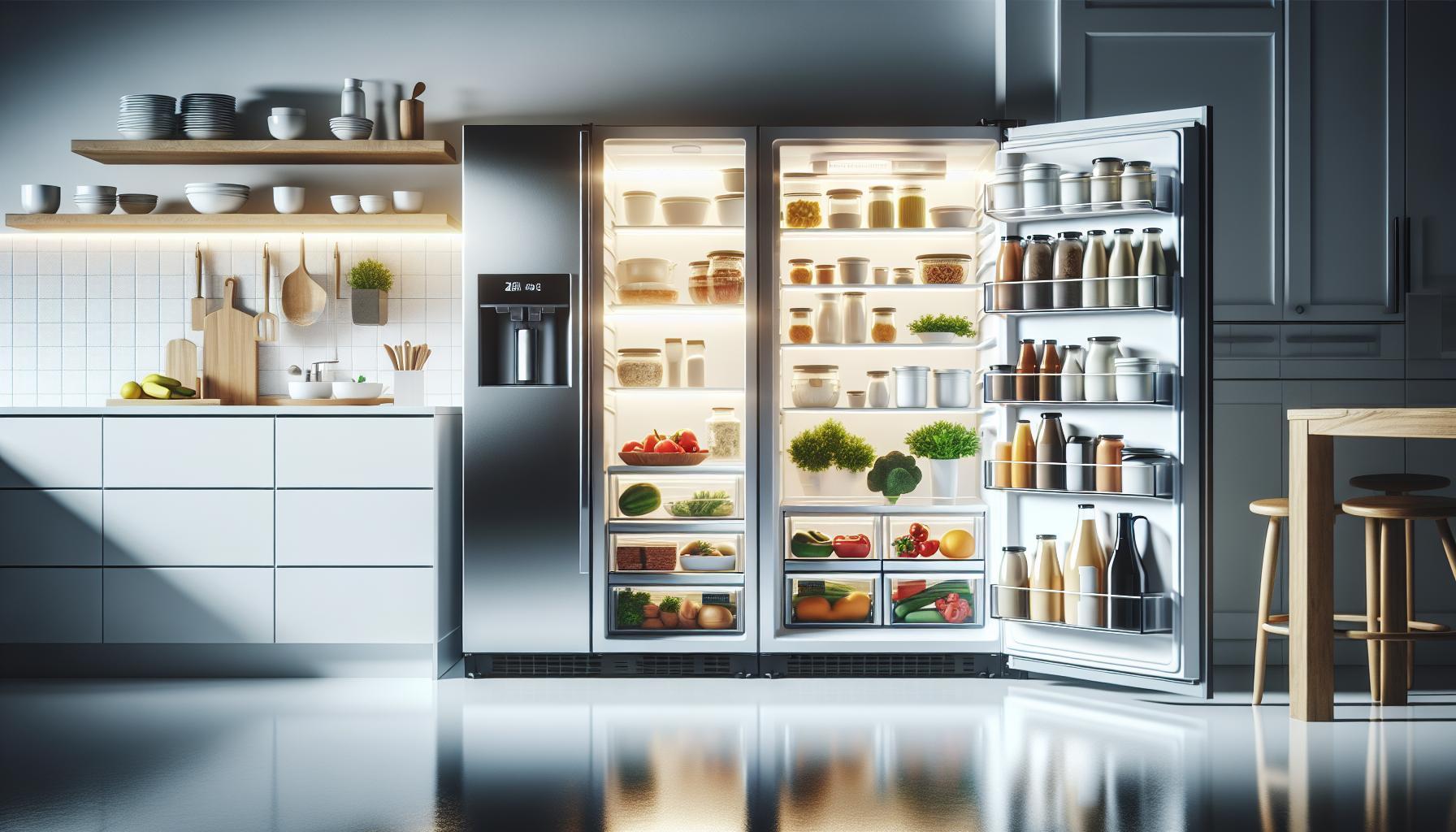Vermouth, a fortified and aromatized wine, adds depth and nuance to cocktails; however, many wonder how long this flavorful elixir actually lasts once opened. To keep your vermouth fresh and flavorful, proper storage and understanding its shelf life are essential. After all, no one wants to compromise the quality of their favorite drinks due to spoilage.
Once opened, vermouth begins to oxidize, altering its taste. If you’re a cocktail enthusiast or enjoy a casual glass on the rocks, knowing how to store your vermouth effectively can help maintain its integrity. You might be surprised to learn how long it can actually last in the fridge, ensuring that every pour is as delightful as the first.
By following simple guidelines, you can savor the complex flavors of your vermouth for weeks or even months after opening. So, let’s dive into the specifics to help you keep your vermouth at its best!
How Long Does Vermouth Last in the Fridge?
When it comes to keeping vermouth fresh and flavorful, understanding its shelf life is essential, particularly once you’ve opened the bottle. Generally, opened vermouth can last for about 1 to 3 months in the fridge, while unopened bottles can retain their quality for up to several years if stored properly. The fortified nature of vermouth, combined with its low alcohol content compared to standard spirits, makes it more susceptible to oxidation, which can alter its taste and quality over time.
To maximize freshness, it’s best to reseal vermouth tightly after each use. A vacuum stopper can significantly reduce exposure to air, helping maintain its flavor profile for a longer duration. Once opened, refrigerating vermouth isn’t just a good practice; it’s a requirement for prolonging its useful life. You may find that sweet vermouth retains its character longer than dry varieties, but both should be consumed within the aforementioned timeframes for optimal flavor.
It’s also wise to keep an eye out for changes in aroma or taste, which are key indicators of spoilage. If you notice an off or musty smell, or if the vermouth tastes noticeably different from when you first opened it, it’s time to dispose of it. Proper storage, typically in a cool, dark place away from direct sunlight, can make a substantial difference, but refrigeration remains the most effective method once the seal is broken. Here are some quick tips for keeping your vermouth fresh:
- Store opened vermouth in the fridge.
- Use a vacuum stopper to minimize air exposure.
- Check for off aromas or flavors before use.
- Consume opened bottles within 1 to 3 months for best quality.
By following these simple guidelines, you can ensure that your vermouth remains enjoyable to sip and mix long after the bottle is open.
Understanding Vermouth’s Shelf Life
Once you open a bottle of vermouth, the clock begins to tick on its freshness. Unlike other spirits which can remain stable for years once opened, vermouth is particularly vulnerable due to its fortified wine base, which often contains a lower alcohol content and added sugars. Understanding how long vermouth lasts is crucial for ensuring that every cocktail or apéritif you make is as tasty and aromatic as it should be.
When stored properly in the refrigerator, opened vermouth typically maintains its optimal flavor for about 1 to 3 months. This relatively short shelf life is largely influenced by oxidation, the process that occurs when oxygen interacts with the wine, gradually altering its taste and aroma. Unopened bottles of vermouth, on the other hand, can remain high-quality for several years, as long as they are kept in a cool, dark place away from direct sunlight. The key to maximizing the life of opened vermouth is to minimize its exposure to air, which is easily achieved by resealing the bottle tightly or using a vacuum stopper.
Another factor worth noting is the type of vermouth. Sweet vermouth often retains its characteristics longer than dry vermouth after opening, but both should ideally be consumed within the recommended timeframe for the best experience. By being mindful of storage techniques and monitoring for any changes in flavor or aroma, you can enjoy your vermouth to its fullest potential without the worry of spoilage. Here are a few storage tips to keep in mind:
- Always refrigerate opened vermouth to slow down oxidation.
- Consider using a vacuum stopper to further decrease air exposure.
- Check for off odors or flavors before mixing into cocktails.
- Follow the 1 to 3-month guideline for consuming opened bottles.
By adhering to these practices, you can ensure that your vermouth remains fresh and flavorful, enhancing your enjoyment as you mix your favorite drinks.
The Science Behind Vermouth Preservation
The delicate balance of flavors in vermouth makes its preservation a fascinating science, as it combines wine with various botanicals, resulting in a product sensitive to environmental factors. Understanding how vermouth maintains its quality hinges largely on its exposure to air and temperature. Once a bottle is opened, oxidation begins-a chemical process where oxygen molecules interact with the wine, causing alterations in taste and aroma. This is particularly crucial for vermouth, since its infusion of herbs and spices can degrade, losing the very complexity that makes it appealing in cocktails.
To keep opened vermouth fresh for up to 1 to 3 months, storing it in the refrigerator is vital. The cold slows down oxidation, helping to retain the beverage’s intended flavor profile. Furthermore, to enhance preservation, consumers should seal the bottle tightly after each use or consider utilizing a vacuum stopper. This tool creates an airtight seal, significantly minimizing oxygen contact with the remaining vermouth. Conversely, unopened vermouth can last several years if stored in a cool, dark place, singularly protected from light and heat, which can also deteriorate its character.
Adding another layer of complexity, the type of vermouth plays a role in how long it lasts after opening. Sweet vermouth typically retains its qualities longer than dry vermouth due to its higher sugar content, which can act as a natural preservative. It’s essential for consumers to regularly check for signs of spoilage, such as off odors or flavors, before mixing them into drinks. By understanding these scientific principles and employing proper storage techniques, you can ensure that your vermouth remains a vibrant, flavorful addition to your culinary repertoire.
- Store opened vermouth in the refrigerator to slow oxidation.
- Use a vacuum stopper for prolonged freshness.
- Monitor for changes in flavor or aroma regularly.
- Sweet vermouth often lasts longer than dry vermouth after opening.
How to Store Vermouth Correctly
To ensure that your vermouth retains its distinctive flavors and aromas for as long as possible, proper storage techniques are crucial. Vermouth, being a fortified wine infused with various botanicals, is sensitive to both oxygen and temperature. After opening, it begins to oxidize, which can swiftly alter its taste profile. Following a few straightforward practices will help you enjoy your vermouth in the best possible condition.
First and foremost, always store opened vermouth in the refrigerator. The cold temperature significantly slows down the oxidation process that occurs once the bottle is opened. Aim to consume your opened vermouth within 1 to 3 months for the best flavor. To further protect its quality, ensure that the bottle is tightly sealed after each use. Using a vacuum stopper is highly recommended; this tool creates an airtight seal that minimizes air exposure, allowing for extended freshness.
For unopened vermouth, you have a bit more leeway. It can remain in good condition for several years when stored in a cool, dark place, away from direct sunlight and heat sources. Think of a wine cellar or a cabinet rather than on a windowsill. This environment helps maintain the integrity of the herbs and spices, preserving the complexity that makes vermouth so appealing.
Regularly monitoring your vermouth for any signs of spoilage, such as changes in scent or an off taste, is also important. Sweet vermouth generally lasts longer than dry vermouth once opened due to its higher sugar content acting as a natural preservative. By following these guidelines, you can confidently store your vermouth to enjoy its delightful flavors whenever you choose.
- Refrigerate opened vermouth to slow oxidation.
- Seal the bottle tightly after each use.
- Consider using a vacuum stopper for better preservation.
- Store unopened vermouth in a cool, dark place for long shelf life.
- Check for signs of spoilage regularly.
Signs Your Vermouth Has Gone Bad
Vermouth, like many other fortified wines, can lose its distinct character and quality over time, especially after opening. Understanding how to identify when your vermouth has turned is crucial for both safety and flavor. The most immediate sign to watch for is a noticeable change in aroma. Fresh vermouth should exude a complex bouquet of herbs, spices, and sometimes fruity notes. If you catch faint or sour scents, it’s a clear indication that oxidation has taken its toll and your vermouth may no longer be safe to consume.
Taste is another critical indicator. When vermouth begins to deteriorate, its flavor profile may shift unfavorably. A previously balanced taste can turn flat or excessively bitter. If your drink tastes off or lacks the vibrant notes you expect, it’s best to err on the side of caution and discard the bottle. Additionally, inspect the liquid for any unusual cloudiness or sediment formation, which may suggest spoilage. Quality vermouth often maintains a clear appearance, and deviations from this could mean that it has gone bad.
Regular monitoring and awareness of these signs can significantly enhance your drinking experience. Keep in mind that sweet vermouth tends to last longer than dry due to its higher sugar content acting as a natural preservative. It’s wise to keep track of when you open your bottles and try to finish them within 1 to 3 months for optimal flavor. By staying vigilant and discerning about these signs of spoilage, you can ensure that your vermouth remains a delightful addition to your cocktails.
The Difference Between Opened and Unopened Vermouth
Vermouth, whether opened or unopened, presents distinct storage challenges and considerations that affect its shelf life and quality. Understanding these differences can significantly enhance your cocktail experience and reduce waste. An unopened bottle of vermouth has a much longer shelf life compared to its opened counterpart. Unopened vermouth, stored in a cool, dark place away from heat and light, can last for years without losing its original flavor profile. In general, most manufacturers suggest that unopened vermouth can be enjoyed even well past the printed best-by date, as long as it has been kept sealed and stored properly.
Once a bottle of vermouth is opened, however, the clock starts ticking. Exposure to air leads to oxidation, which can alter the delicate balance of flavors. Opened vermouth is best consumed within 1 to 3 months for optimal taste and quality. Although a bottle of opened vermouth can still be safe to drink for up to a year, its flavors will likely degrade significantly, becoming flat or unpleasant over time. To maximize freshness, store opened vermouth in the refrigerator. The cooler temperature helps slow down oxidation, preserving its aromatic qualities and taste longer than if it were left at room temperature.
To ensure you get the most out of your vermouth, consider these tips for distinguishing between opened and unopened varieties. Always check the seal on unopened bottles for integrity; a broken seal indicates potential exposure to air. For opened vermouth, pay attention to aroma and taste regularly. If you notice a significant change-like a sour smell or off taste-it’s time to discard the bottle. Additionally, using a vacuum seal wine preserver can further extend the life of your opened vermouth by minimizing air exposure.
In summary, the state of your vermouth can greatly influence its longevity and flavor. Knowledge about proper storage and consumption timelines empowers you to enjoy your vermouth in its best condition, ensuring it remains a delightful addition to your cocktails.
Flavor Impact Over Time: What to Expect
The flavor profile of vermouth is dynamic and can change significantly over time, especially after the bottle has been opened. When you first uncork a bottle of vermouth, its vibrant aroma and deliciously balanced notes of herbs, spices, and botanicals can enhance your cocktails beautifully. However, as the vermouth is exposed to air, a process called oxidation begins. This can lead to a gradual decline in flavor quality.
Initially, for the first 1 to 3 months after opening, vermouth retains most of its intended flavors, giving you that refreshing and aromatic taste perfect for mixing. It’s essential to store opened vermouth in the refrigerator to help slow down oxidation and preserve its unique characteristics. If stored appropriately, the vermouth can still be usable for up to a year, but expect noticeable changes. Over time, you might find the once vibrant herbal notes becoming muted, and the overall flavor might become flat or overly bitter. This loss of complexity is particularly evident in dry vermouth, which relies heavily on its delicate aromatics.
To effectively manage the flavor integrity of your vermouth over time, consider the following factors:
- Aroma Assessment: Regularly sniff the bottle, as a sour or musty smell is often a telltale sign that the vermouth has gone bad.
- Taste Testing: Pour a small amount and taste; if it lacks the original sharpness or tastes stale, it’s time to discard it.
- Keep it Sealed: For opened bottles, using a vacuum seal wine preserver can significantly extend the shelf life by minimizing air exposure.
By understanding these elements, you can preserve the enjoyable qualities of your vermouth for as long as possible, making each cocktail experience delightful. Regular monitoring will not only help you appreciate the unique aspects of your vermouth but also ensure that you avoid subpar flavors in your favorite drinks.
Tips to Keep Vermouth Fresh Longer
To preserve the fresh and vibrant characteristics of your vermouth, adopting the right storage techniques is crucial. While the ingredient list of vermouth might allow for a longer shelf life than many other spirits, keeping it at its best requires attention. Keeping your opened vermouth in the fridge is a foundational step, as the cooler temperature significantly slows the oxidation process that leads to flavor degradation.
One effective strategy is to use wine preservation tools such as vacuum stoppers. These devices remove air from the bottle, significantly reducing the amount of oxygen that interacts with the liquid, thus prolonging the freshness of the vermouth. If a vacuum stopper isn’t available, ensure the cap or cork is tightly sealed after each use. For those who routinely enjoy cocktails, consider buying smaller bottles that will be consumed within a short period, thereby minimizing the time the vermouth is exposed to air.
Another tip is to keep your vermouth away from direct sunlight and heat, which can adversely affect its flavor. Store the bottle upright in a cool, dark place, as extreme temperatures can also promote spoilage. It may be tempting to place the bottle in a bar cart or on a kitchen shelf, but these areas often experience varying temperatures, potentially shortening your vermouth’s lifespan.
Regularly checking the aroma and taste of your vermouth will also help identify any changes. If you notice any off smells or a flat, stale taste, it’s wiser to discard the bottle rather than risk compromising your cocktail quality. By observing these simple practices, you can enjoy your vermouth at its peak, ensuring delightful cocktails for months after opening.
Using Preservatives: Myths vs. Facts
Using preservatives can significantly impact the shelf life and flavor profile of vermouth, but there are several myths and facts that consumers should understand. One common misconception is that simply adding chemical preservatives can indefinitely extend the life of vermouth. In reality, the nature of vermouth-a fortified wine infused with a variety of botanicals-means that it is more susceptible to flavor changes once opened. While some commercial brands may include small amounts of sulfites to help prevent spoilage, this does not mean that the vermouth will remain fresh beyond its recommended timeframe.
When it comes to preserving an opened bottle of vermouth, the focus should be on proper storage techniques rather than relying solely on preservatives. The cooler temperatures of a refrigerator can slow oxidation, which is one of the primary reasons drinks go stale. Along with using storage solutions like vacuum stoppers, ensuring that the bottle is well-sealed after each use is essential. This minimizes the interaction with air, which can drastically alter the taste over time.
Facts About Preservatives and Vermouth
- Sulfites: These are common in many wines, including vermouth, and can help prolong freshness by preventing oxidation, but they can’t completely stop the process.
- Natural Alternatives: Some enthusiasts recommend natural methods, such as storing vermouth in smaller bottles, to limit air exposure and maintain flavor.
- Storing Up to Six Months: Opened vermouth can typically last 1 to 3 months in the fridge, but some may retain acceptable qualities for up to 6 months when stored properly.
In conclusion, while preservatives play a role in extending the life of vermouth to some extent, they should not be seen as a foolproof solution. Understanding the limitations of these substances and focusing on proper storage techniques will allow you to enjoy your vermouth’s vibrant flavors for a longer period. Regularly checking for changes in aroma and taste will further ensure that you are consuming the highest quality vermouth possible.
Creative Ways to Use Expired Vermouth
If you find yourself with a bottle of vermouth that’s past its prime, don’t toss it just yet! While the flavors may not be as vibrant as when it was fresh, expired vermouth can still be put to excellent use. There are several creative and practical ways to incorporate it into your culinary adventures or cocktails, maximizing its potential even after its shelf life has lapsed.
One fantastic way to utilize expired vermouth is by adding it to sauces and marinades. The complex flavors from the botanicals in vermouth can enhance a variety of dishes, especially those with rich meats or seafood. You can deglaze a pan after cooking chicken or fish, scraping up the browned bits while adding depth and a touch of sweetness to your sauce. Alternatively, mix it into marinades to impart unique flavors to grilled or roasted vegetables, meats, or tofu.
Another option is to use expired vermouth in salads and dressings. Incorporating it into vinaigrettes can add a nuanced flavor that complements fresh greens, roasted vegetables, or grain salads. Try combining equal parts vermouth and olive oil, with a squeeze of lemon juice, salt, and pepper for a quick, delicious dressing. The acidity of the expired vermouth can also brighten up heavier dishes, making it a smart addition to your culinary lineup.
If you’re looking to mix up your cocktail game, consider using expired vermouth in a spritz or a cocktail where vermouth is just one of many ingredients. For instance, blend it into a fruit-forward punch or a refreshing spritzer with sparkling water and your favorite fruit. Though the taste may not be as lush as fresh vermouth, it can still provide a pleasant herbal note that contributes to the overall complexity of the drink.
Lastly, don’t overlook the possibility of using expired vermouth in baking. Certain dessert recipes can benefit from the unique flavor profile vermouth offers. Try incorporating it into fruit tarts, poached peaches, or even brownies where the herbal notes can harmonize with chocolate. Just keep in mind to adjust sugar levels accordingly to accommodate the sweetness of the vermouth.
In summary, expired vermouth, while not suited for sipping on its own, can shine brightly in culinary applications. By harnessing its complex flavors in sauces, dressings, cocktails, and even dessert, you can reduce waste and enhance your meals in surprising ways. Always use your senses to judge the quality, and if it smells off or has an unusual color, it’s best to avoid using it. Happy cooking!
Storing Other Spirits: Comparisons and Insights
Properly storing vermouth not only extends its shelf life but is also crucial for preserving its unique flavor profile. When comparing vermouth storage to other spirits, distinct differences arise due to vermouth’s unique composition as a fortified, aromatized wine. Understanding these nuances can help maximize your enjoyment of this versatile beverage.
Vermouth, unlike hard liquors such as whiskey or vodka, is more sensitive to oxygen and light due to its lower alcohol content and inclusion of various botanicals. Once opened, vermouth should ideally be consumed within one month to ensure optimal flavor. In contrast, spirits like bourbon or scotch can last indefinitely when stored correctly, as their high alcohol content inhibits bacterial growth and oxidation. However, all spirits should be kept away from heat sources and direct sunlight to prevent changes in flavor and quality over time.
To adequately store vermouth, refrigeration is recommended after opening. This slows down the oxidation process and helps maintain the integrity of its flavors. If you accidentally leave a bottle of vermouth out, it’s best to use it within a week or two. For comparison, opened bottles of gin typically remain fresh for about a year at room temperature. To further illustrate the differences in storage needs, here’s a quick summary:
| Spirit Type | Storage After Opening | Estimated Freshness Duration |
|---|---|---|
| Vermouth | Refrigerate | 1 month |
| Gin | Room Temperature | 1 year |
| Whiskey | Room Temperature | Indefinitely |
In conclusion, being aware of the specific storage needs of vermouth in comparison to other spirits can enhance your home bar experience. By storing vermouth in the fridge and keeping track of its shelf life, you can ensure that every cocktail and culinary creation remains flavorful, aromatic, and enjoyable.
Vermouth Pairings: Best Foods to Enjoy
Understanding the ideal food pairings for vermouth can enhance not only your dining experience but also the longevity of the flavors in your bottle. Vermouth, with its aromatic complexity-from the floral notes of dry vermouth to the spiciness of sweet vermouth-pairs beautifully with a variety of foods. When serving, consider how the flavor profile of the vermouth complements different dishes.
For dry vermouth, opt for light and fresh foods that mirror its crisp characteristics. Seafood is a standout pairing; think grilled shrimp or white fish served with a citrusy vinaigrette. Additionally, an assortment of olives, nuts, and marinated vegetables provides a delightful contrast to the wine’s herbal notes. For a simple yet enjoyable experience, a classic charcuterie board featuring mild cheeses, prosciutto, and crackers works wonders, enhancing the overall flavor profile of your aperitif.
Sweet vermouth shines when paired with richer and more robust foods. It complements cured meats like salami and pancetta well, while the herbal complexity can balance the richness of creamy cheeses, such as blue cheese or aged cheddar. When it comes to dessert, consider dark chocolate or fruit-based pastries, which can accentuate the sweet and spicy notes inherent in the vermouth.
To maximize the flavors, consider serving vermouth lightly chilled and as a spritz or in cocktails with fresh herbs and citrus. This not only refreshes the palate but ensures the vermouth remains enjoyable throughout its shelf life after opening. Remember to store opened vermouth in the fridge and aim to consume it within a month for the best experience. By choosing the right food pairings and serving techniques, you can fully appreciate vermouth’s richness and maintain its delightful character long after opening.
FAQ
Q: How can I tell if my vermouth has gone bad?
A: Vermouth may have gone bad if it develops an off or sour smell, changes in color (especially if it darkens), or if it tastes significantly different than when you opened it. Always check for these signs, ideally storing vermouth in the fridge after opening to prolong its life.
Q: Can I freeze vermouth to extend its shelf life?
A: Freezing vermouth is not recommended as it can alter the flavor and texture due to its alcohol content and sugar levels. Instead, keep it tightly sealed in the fridge and use within a month after opening for optimal quality.
Q: What is the best way to store opened vermouth?
A: The best way to store opened vermouth is in the fridge. Ensure the bottle is tightly sealed to limit oxidation and maintain its flavor integrity, ideally using it within a month for the best taste.
Q: Does unopened vermouth expire?
A: Unopened vermouth does not technically expire but may lose flavor over time. It’s best consumed within three to five years for optimal quality. Store it in a cool, dark place to preserve its taste.
Q: How long does sweet vermouth last once opened?
A: Sweet vermouth typically lasts about one month in the refrigerator after opening. For the best flavor experience, use it within this timeframe, as exposure to air can degrade its quality.
Q: What are the storage recommendations for dry vermouth?
A: Dry vermouth can last for about 3 to 4 months after opening when stored in the fridge. Keeping it sealed tightly is crucial to prevent oxidation, which can alter its flavor profile.
Q: Why does vermouth need to be refrigerated after opening?
A: Refrigerating vermouth after opening slows the oxidation process, which helps retain its flavor and aroma. This is especially important for preserving the unique characteristics that make vermouth a flavorful ingredient in cocktails.
Q: Can I mix old vermouth in cocktails?
A: While you can use old vermouth in cocktails, ensure it still has a pleasant smell and taste. If it has significantly changed or developed unpleasant flavors, it’s best not to use it, as quality impacts your drink’s overall flavor.
In Retrospect
Now that you know how to keep your vermouth fresh and flavorful in the fridge, it’s time to put that knowledge to good use! Remember, properly stored vermouth can last for about one month after opening, ensuring your cocktails remain vibrant and aromatic. Don’t let your stash go to waste-enjoy that perfect martini or spritzer tonight!
For more insights on finding the right vermouth for your cocktails, check out our guide on the different types of vermouth and how to use them effectively. Plus, if you’re interested in cocktail recipes that elevate your mixing skills, visit our cocktail ideas section for inspiration!
Have more questions about vermouth storage or your favorite drinks? Join the conversation in the comments below, and don’t forget to subscribe to our newsletter for tips and tricks that keep your bar fully stocked and your cocktails top-notch. Cheers to great taste and even better drinks!





